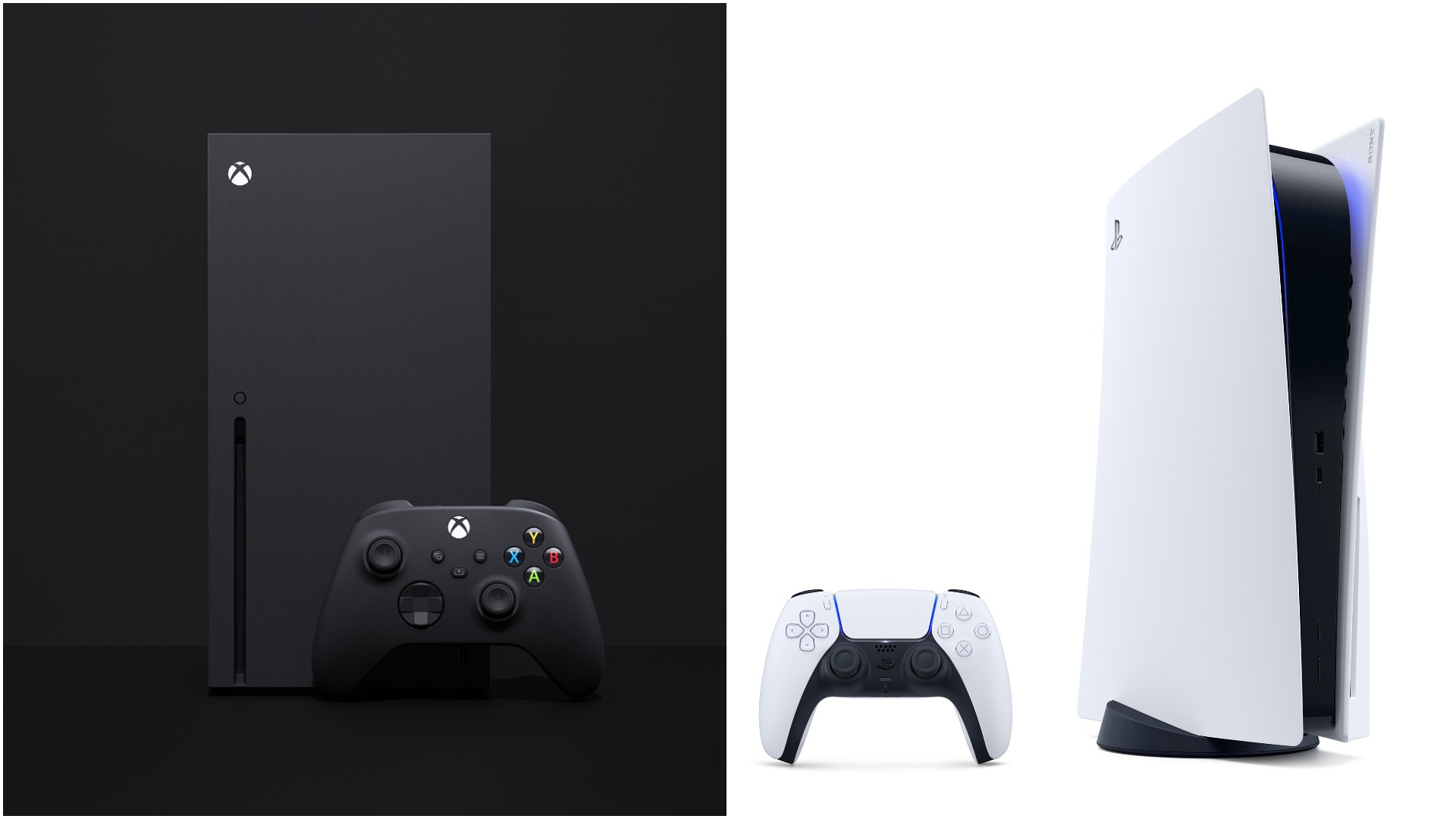
As hard as it is to believe, this month marks the third anniversary of both the PlayStation 5 (November 19) and Xbox Series X (November 10). Given that each console launched in the midst of a global pandemic, it has been fair to say that their runs thus far have been…unusual, to say the least. Hardware shortages, prolonged game delays, and unprecedented levels of previous-generation support have often made it necessary to stop and remind yourself that we are indeed in the Xbox Series X/PS5 era of gaming.
Now that each console is easier to find, though (and new games are coming at a fast and furious pace), now seems like a great time to take another look at where each console stands. For additional context, I’ll also be including snippets from, and links to, our original 2020 reviews of each console to show how much has (and hasn’t) changed regarding our thoughts about each piece of hardware.
However, please note that this article is limited to the PlayStation 5 and Xbox Series X. Though I actually love the Xbox Series S, it isn’t necessarily designed to be measured as an equal to either of those consoles. As for the Nintendo Switch, we’ll have plenty of thoughts about that console in the near future and as part of our end-of-the-year review series.
PlayStation 5
What We Said – Sony seems determined to carry on its “games first” philosophy from the PS4 while exploring the room a bit more in terms of a console’s multimedia potential and advanced features. Because of that, you’ll probably end up wanting a PS5 at some point, but don’t feel too bad if that’s not until 2021 (at the earliest) as we’re still months away from next-gen consoles truly becoming the industry standard. (Read Our Full Original PS5 Review Here)
My main takeaways from my earliest days with the PlayStation 5 have changed remarkably little over the last three years. It’s clear that Sony wants people to think about the biggest (and usually the best) new games when they think of the PS5. Though they have largely succeeded in their efforts, Sony’s desire to hold on to certain traditions has occasionally come at the cost of meaningful progress in other areas.
The fact of the matter is that if you want to play some of the best new games released in the last three years, you need to own a PS5. That includes the likes of Marvel’s Spider-Man 2, God of War: Ragnarök, Final Fantasy 16, and Demon’s Souls. While the PlayStation team has been much more generous with their PC ports in recent years (a welcome surprise), Sony still clearly believes that the console with the best exclusive games (and the most of them) will likely outperform the competition. To date, that seemingly simple strategy has proven to be remarkably sound.
The most surprising ace up the PS5’s sleeve in that respect has actually been the console’s controller: the DualSense. While the DualSense’s various advanced functionality often cost the controller quite a bit of battery life, that trade-off has largely been worth it. Features like adaptive triggers and advanced haptic feedback really have helped PS5 exclusives quite literally feel different from everything else out there.
It’s not just exclusives that have benefited from that controller’s features, though. More and more third-party titles are offering enhanced DualSense functionality. Some of those titles (like Alan Wake 2) arguably use the DualSense better than any exclusive. Over the last few years, nearly every preview event I’ve been to has featured the PS5 version of the game on display (if it is available) or offered us a PS5 controller to use. I can see why. If two games offer relatively similar looks, sounds, and performance on Xbox Series X and PS5, then the DualSense will likely give the PS5 version of that game that little advantage that helps push it over the top.
Interestingly, PlayStation’s focus on exclusives has benefited at least the popular perception of the PS5’s graphical power. Technically speaking, the PS5 and Xbox Series X are roughly equal in terms of raw hardware power. Early on, though, many analysts gave a slight edge to the Series X in that department. Yet, those PS5 exclusives that are clearly designed to maximize the PS5’s hardware potential have also become the gold standard for next-gen visuals and performance. At a time when such things are often measured in degrees, those exclusives have helped make it easy to buy into the idea that the PS5 is simply the more powerful next-gen console. At the very least, it regularly offers more games that feel like proper next-gen experiences.
It all comes back to this relatively simple point. If you want the best exclusives (and some of the best versions of the greatest third-party titles), you’re probably going to want to buy a PS5. It’s not exactly hard to see why the PS5 has been such a sales juggernaut.
Yet, the PS5 has been far from perfect so far. Actually one of my biggest disappointments with the console thus far has been one of the features that initially impressed me most about it: the PS5’s various UI and system features.
At first, the PS5 seemed to be a wonderland of possibilities. Sony was quick to hype console features like the PS5’s control center, activity cards, media sharing capabilities, and other mechanics designed to make the PS5’s interface the center of your gaming world. Why go look for a guide online or open a social media app to share a screenshot when the PS5 could do all of that for you?
However, things haven’t quite worked out that way. The PS5’s various control center features have largely been undone by some clunky UI decisions and a general lack of incentive to go out of your way for what little they often have to offer. For instance, being able to pull up an Activity Card to jump to a specific part of a game sounds nice, but it rarely ever feels like your best practical option and it hasn’t grown much since the console’s launch. Even the PS5’s much-hyped “Share” button recently took a big hit thanks to a series of external alterations that have greatly reduced its intended functionality.
Factors in and out of Sony’s control have turned former software selling points into surprisingly superfluous gimmicks. Though I’ll expand upon this more in a bit, the fact of the matter is that I would have rather had access to some of the Xbox Series X’s seemingly smaller quality-of-life features than these elaborate PS5 functions that ultimately end up being easy to ignore.
Perhaps more importantly, PlayStation has yet to find a subscription service that makes sense for them. PlayStation has made it clear that they do not intend to develop a direct Game Pass competitor, but the company’s numerous attempts to modify PlayStation Plus’ functionality to offer various subscription service benefits have largely been whiffs. PlayStation is clearly interested in offering such “premium” services at inflated prices, but they’ve yet to find the service that feels truly premium (much less one that makes up for the sting of not having a Game Pass equivalent option).
Generally speaking, Sony has had a hard time keeping up in terms of expanded service options. The PS5 offers more native backward compatibility support than the PS4, but it is leagues behind what the Xbox Series X provides. PlayStation’s cloud gaming, remote play, and PC port options have improved, but they don’t really lead the way in any of those categories. Interestingly enough, the one area of future tech that Sony has invested heavily in (the PSVR hardware) has largely been a massive disappointment.
The fact of the matter is that it remains hard to argue against buying a PlayStation 5. It has the best exclusives, some of the best versions of the biggest third-party games, and a fantastic controller. Furthermore, it looks quite nice and it runs everything well so long as you don’t stray too far from its baseline functionality. Yet, there haven’t been many reasons to believe that the PS5 will grow to become more than a very good example of what we’ve come to expect from a major gaming console in the last couple of decades.
For many, that will be more than enough. However, in the face of increased competition from Microsoft and Nintendo, it will be interesting to see if Sony finds a way to use its industry-leading advantages to actually lead the hardware industry into the future.
Xbox Series X
What We Said – The Xbox Series X is a powerful machine and an impressive hardware upgrade for anyone looking for a home console that can run games at 4K resolution and up to 120 frames per second. (Read Our Full Original Xbox Series X Review Here)
If I’m going to kick off my thoughts about the PS5 by praising that console’s lineup of exclusives, then it only feels appropriate to kick off my thoughts about the Xbox Series X by telling you that the Xbox team has consistently dropped the ball in that same department.
Xbox’s inability to regularly produce noteworthy console exclusives is starting to become a serious blight on the company’s gaming legacy. The Xbox One’s various failures eventually made it tragically easy to accept that Microsoft needed to lick its wounds and start planning for the future. Now that the future is here, though, it really is time to start raising questions about why there are so few true Xbox Series X exclusives despite Microsoft’s various studio acquisitions over the years.
Titles like Sea of Thieves, Starfield, the Forza series, Pentiment, and Hi-Fi Rush are all fantastic (even if they’re also available on PC), but they just can’t compete with the impact of the major exclusives that PlayStation is putting out. Furthermore, a couple of recent notable Xbox exclusives (Halo Infinite and Gears 5) have fallen short of the expectations set by those legacy franchises. Again, that might be less of a big deal if Xbox had kicked off some notable new franchises (or produced a steady stream of smaller projects) in recent years, but that hasn’t really been the case.
As mentioned above, that lack of exclusives has hurt the popular perception of the console’s power level. With so few games that are designed to showcase the Xbox Series X at its absolute best, the Xbox Series X sometimes feels weaker than the PS5 from a pure hardware power perspective.
You can talk about the sometimes predatory nature of the entire exclusive games concept all you want (and there are certainly important discussions to be had about that subject). However, that’s a cold comfort to those who only own an Xbox and have to look at the blockbuster, generation-defining titles available on the PS5 that they may never get the chance to play. Exclusives still matter, and Xbox just doesn’t have them.
It’s hard to convince a gamer without either console to buy the one that not only has arguably weaker exclusives from a quality perspective but objectively fewer exclusives from a sheer quantity perspective. Xbox still has time to figure this out, but there have been tragically few indications thus far the Series X will really ever catch up to the PS5 in that area.
That’s a shame, because I have to say that the Xbox Series X has quickly become my favorite piece of hardware in this generation in several other major areas.
Most notably, the Xbox Series X’s Quick Resume feature has been the actual game changer that the PS5’s more elaborate features were supposed to be. The first time I loaded a game and picked up right where I left off within seconds was a real eye-opening moment. Since then, I haven’t started a PS5 game without thinking of how much I wish that the console offered its own Quick Resume feature (or a better version of it). I would gladly trade most of the PS5’s more elaborate (yet rarely utilized) system features for that massive QoL improvement.
I’d also argue that the Xbox Series X offers the best UI out of the three major current consoles. It’s not a work of digital art by any means, but it’s often clean and leaves you with very little doubt about where to go to access most of its vital functions. The things that you usually do when you boot up your console are all easy to access, and the deeper features are never too far away.
The Xbox Series X controller benefits from a similar emphasis on functionality. To be clear, it still doesn’t come anywhere close to matching the advanced feedback features that the DualSense offers. However, it feels good, it’s responsive, it’s durable, and even though it still relies on external batteries, its battery life is simply exceptional. It does everything you need it to do with little fuss but with little flash.
In general, the Xbox’s enhanced accessibility options are starting to become an increasingly vital talking point. Said accessibility options include things like the console’s various software settings and controller options, but they also extend to areas like the console’s support of external storage options and enhanced backward compatibility features. Those backward compatibility features are no small thing. The PS5 offers enhanced versions of some PS4 games, but the Series X can play almost any Xbox-supported game ever made and enhance it with various performance benefits. Though the Series X (and the Xbox team) have not been perfect in that respect, they continue to make clear strides in consumer-benefiting areas that other manufacturers are largely content to ignore.
Of course, you can’t really talk about Xbox Series X without talking about Game Pass. That subscription service was the Xbox One’s biggest selling point, and the situation remains largely the same for the Xbox Series X. Actually, we’re past the point when you can simply call Game Pass the best value in gaming. Being able to access such a massive library of titles (including quite a few “Day One” new releases) is the kind of thing that is nearly impossible to go back from. That’s especially true for those who use the service to try new games they would have otherwise never been able to purchase at full price. On a day-to-day basis, I use my Xbox Series X more than my PS5, and that’s largely because of Game Pass.
That’s the weird spot the Xbox Series X finds itself in. It’s an exceptional console to play day-to-day that has greatly benefited from Microsoft’s forward-thinking nature. Yet, when you get to the seemingly simple topic of exclusive games, all that praise for the Xbox Series X hits a wall that Microsoft has not only failed to tear down but has slowly been contributing to brick by brick and year after year.
The Verdict
Whenever someone asks me which next-gen console they should buy, I try to give them as much information about the virtues of each console as I can without that conversation becoming really annoying, really fast. Ultimately, though, it always seems like the argument for the PlayStation 5 tends to be a bit stronger at this point in the hardware race.
We have not quite arrived at the future for gaming that Sony often seems content to ignore or downplay. And in a present where the average gamer typically buys a few major games a year, PlayStation has more of those games to offer and fantastic versions of the games it shares with other platforms. PlayStation also often enjoys an almost Apple-like status that makes them the popular premium brand to own if you only own one console. Sony seems to be fully aware of all of that, and they’ve made an exceptional console for those types of gamers as well as the gamer who just wants to ensure they have access to the absolute best titles in a generation. The PS5’s controller and design also lend it an element of excitement (even if only a cheap thrill) that the Series X sometimes lacks.
Mind you, I say all of that while telling you that I am confident I have used my Xbox Series X more than my PS5 in the last three years. The power of Game Pass is becoming increasingly difficult to deny, and the Xbox team did an exceptional job of designing a console that is simply a pleasure to use. In a world where the Xbox Series X doesn’t quite win this console race, I can easily see a future filled with articles about what a gem of a console it was and how nobody appreciated its best ideas. That just makes it that much more of a shame that Xbox hasn’t done more to sell people on the many virtues of its gaming console with the thing that typically sells people on gaming consoles: great games they can’t play anywhere else.
As we finally come out on the other side of those devastating hardware shortages that contributed to this generation of gaming’s terrible start, it’s easier than ever to appreciate what exceptional pieces of hardware the PS5 and Xbox Series X are. I look forward to seeing where each goes from here. However, if you’re looking for something a little more definitive than all of that, I’d say that the Xbox Series X’s hardware and UI with the PS5’s exclusive game lineup and controller would pretty much be the perfect next-gen console.
The post Xbox Series X vs. PlayStation 5: Reviewing Each Console Three Years Later appeared first on Den of Geek.








